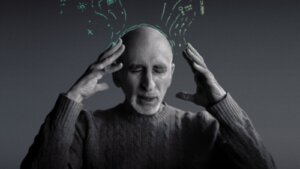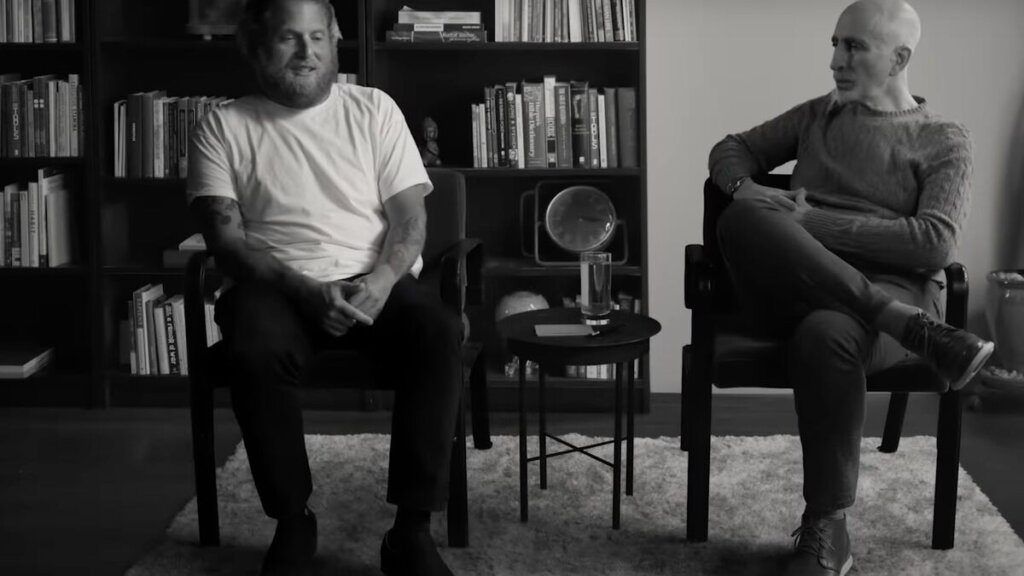'Stutz': A Moving Documentary


Written and verified by the psychologist Valeria Sabater
If you haven’t seen the Netflix documentary, Stutz, you’re missing out on one of the most extraordinary and emotional shows ever to have been shown on this platform. The actor and director, Jonah Hill, created the production as a tribute to his therapist, the person who offered him the necessary tools for managing his insecurity. In fact, this show is an audiovisual gift that’s both revolutionary and inspiring.
Throughout history, many figures have paid homage to their mental health professionals, the people who changed their lives. One example was the modernist American poet, Hilda Doolittle, known as HD. She wrote Homage to Freud, a book about how the father of psychoanalysis helped her when she was struggling with her mental health.
However, renowned comedian and two-time Oscar nominee Jonah Hill does more than simply pay homage to his psychiatrist. His conversation with his therapist is a brave and honest dialogue about mental health, vulnerability, and human flaws. Moreover, these two men are united by a really warm and emotional bond. In fact, in this show, the therapist becomes the patient and reveals the inner labyrinths of his mind.
“Anyone can take an unpleasant experience and turn it into an opportunity.”
-Phil Stutz-

Phil Stutz
Phil Stutz is an American psychiatrist who developed one of the most innovative techniques for optimizing human potential. In his long professional career, he’s been a prison psychologist for various institutions, such as Rikers Island. In addition, he was one of the most prestigious private psychologists in the Big Apple.
In the 80s, he settled in Los Angeles, becoming, according to some, the ‘most wanted psychiatrist in Hollywood’. Indeed, he’s helped thousands of writers, artists, producers, and CEOs deal with their insecurities, traumas, and problems, awakening their creative and healing abilities.
However, Phil Stutz is most famous for his book, The Tools (2012), written together with therapist Barry Michels. In this work, they provide an innovative therapeutic approach based on the tools, mechanisms, and resources that we can all develop by activating our ‘higher forces’ to solve problems.
“The ‘tools’ turn problems into possibilities and give people the propulsive feeling that they can make big changes.”
-Phil Stutz-
The documentary, a soul-bearing tribute
In the documentary, Jonah Hill invites us to witness an insightful journey into the mind of his therapist, Phil Stutz. In the beginning, we think that it’ll be the actor who bares his soul, but this isn’t the case. “I’m making a movie about you, not about me,” he tells Stutz. In fact, Jonah focuses almost all of his attention on Stutz.
Hill uses clever movie tricks to portray what looks like a therapy session. He uses black and white to create intimacy and even to produce tenderness. This emerges from virtually the first moment. Hill is the one who asks most of the questions, while the psychiatrist introduces us to his therapeutic method, a solution-based technique that uses card visualization.
A weak pulse and a prodigious mind
Phil Stutz suffers from Parkinson’s. This is noticeable as soon as he picks up one of his famous cards to illustrate his tools. His hands are shaky and he can barely carry out his famous technique. However, this doesn’t prevent him from teaching it to us.
According to Stutz, we can all change our emotional states almost immediately. This is done by taking unpleasant experiences and thoughts and turning them into opportunities. But, this requires strategies, the same ones that have improved the lives of hundreds of his patients, like Jonah Hill.
Phil Stutz’s Tools
In the book, The Tools, Stutz claims that any psychological or existential crisis is an opportunity for personal growth and evolution. To do this, we have to use the ‘tools’, which activate the internal forces that we all have and that we must develop. Stutz pedagogically illustrates them in the documentary. They’re as follows:
- Reality. We must be aware that our lives are dominated by three aspects. These are pain, uncertainty, and constant work. The last element will allow us to handle the first two.
- The life force. Three forces define who we are and how we can improve our existence. The first is our relationships with our bodies, the second is our relationships with other people, and the last is our relationships with ourselves.
- Part X. We all have dark zones that prevent change. These areas represent a kind of resistance that, like villains, hinder everything.
- The pearl necklace. Life can be seen as a necklace of different stones. Each stone is an action. They’re the tasks and activities that we carry out daily. Some have dark and imperfect sides, but we can always make the next one more perfect and beautiful.
- The kingdom of illusion. According to Stutz, we all focus on achieving perfection. For example, perfect jobs, perfect partners, etc. However, this brings us suffering.
Phil Stutz’s teachings must be seen through his drawings to be better understood. Afterward, we can close our eyes and delve into them to grasp their meaning.
An exercise in wonderful vulnerability
The documentary offers a moving reflection on Jonah Hill and his therapist, Phil Stutz, the psychiatrist who’s fighting against the unstoppable advance of Parkinson’s. The show allows us to glimpse his problems of anxiety, insecurity, emptiness, shame, his past when he was overweight, and the death of his brother.
In fact, Stutz bares his soul before the camera. He talks about the death of his younger brother and his complex relationship with his mother that limited, in a certain way, his ability to bond emotionally. In addition, he doesn’t hesitate in talking about his illness, about how Parkinson’s goes beyond the tremor in his hands and the rigid body he has to fight against every day.
Jonah and Stutz talk about mental health with honesty, vulnerability, and love. They’re not just a patient and therapist, they’re two friends sharing similar stories who don’t hesitate in saying “I love you” while, at the same time, joking with each other.
The need for such productions
Stutz’s documentary resonates with us emotionally. It’s innovative, warm, and reflective as well as funny. It isn’t a filler program, it’s an essential and courageous production that we should all watch. After all, although we live in a time when increasingly more celebrities are talking about their mental health and many see it as something that’s ‘in fashion’, it’s not like that.
As a matter of fact, we must talk more about psychological problems to eliminate the stigma. We need collective testimonies to understand that everyone, at some point, goes through these kinds of experiences.
Thanks to Jonah Hill, in this show, we don’t just see another star revealing their problems. He brings us a psychiatrist capable of sharing tools while revealing his problems, sadness, and vulnerabilities. After all, not even those who know to get us out of our black holes are immune to the suffering of life.
All cited sources were thoroughly reviewed by our team to ensure their quality, reliability, currency, and validity. The bibliography of this article was considered reliable and of academic or scientific accuracy.
- Martinez-Martin, P., Rodriguez-Blazquez, C., Paz, S., Forjaz, M. J., Frades-Payo, B., Cubo, E., … & ELEP Group. (2015). Parkinson symptoms and health related quality of life as predictors of costs: a longitudinal observational study with linear mixed model analysis. PLoS One, 10(12), e0145310.
This text is provided for informational purposes only and does not replace consultation with a professional. If in doubt, consult your specialist.








